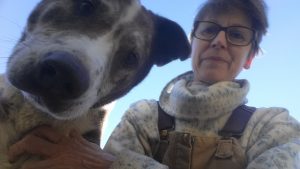Life in the Sci-Fi Movie
Thanks for clicking on this, our 6th issue of the TASP e-newsletter. We’re a little late getting this out to you for myriad reasons all relating to juggling volunteer activities amid jobs, families, aging pets and “The Invisible Enemy.” At this writing, Rich and I are in pseudo-isolation here on the farm, observing social distancing as much as is practical. The business I work for is considered essential so it’s off to work I go each weekday, with my mask dangling from my rearview mirror, ready to be donned at the least sign of an approaching human.
I count my blessings daily about my own health and the location of our home that is 20 minutes from civilization in any direction. Being farmers for so many years, we became accustomed long ago to stockpiling two weeks’ worth of groceries meds and staples in our basement; that’s what country people do. And having the privilege of just being able to let the dogs out into a safe, secure yard where we don’t have to worry about sharing a 6-foot radius with a stranger while leash walking is something we can’t possibly take for granted. Our hearts go out to all the folks with pets in the cities who have to share elevators and sidewalks to exercise their best friends. We know this piles stress upon stress right now.
Speaking of stress-upon-stress, I’ve been observing animals (my own and those of local owners in need) as they go to the vet clinics and hospitals these days and I recognize this is not an ideal situation for anyone concerned: pet/vet/guardian. For those of you who haven’t yet had to avail yourselves of a visit to the vet since February, here’s how social distancing at the vet’s office goes: you drive up to the building, text or call the vet front desk to announce your arrival, and then a gloved, gowned, masked vet tech comes out to take your pet from you. They carry or leash-walk the pet inside while you sit in your car and await a call from the vet who discusses diagnosis and treatment with you. Then you wait some more while that work is done, and then another call from the front desk to collect the fee via credit card over the phone. At last, the vet tech brings your freaked out pet back to your car and you drive them home, hoping that the pet will forgive you for what you just put them through.
It’s all necessary. But so many things can go sour throughout a process like this, it’s hard to list them all here. There’s the possibility of the pet falling or getting loose from its leash/collar during the walk to and from the vet’s building. There’s the possibility that the gowned, masked, gloved vet will misread the pet’s symptoms because that pet hadn’t previously ever seen a human dressed like this (usually they’re already under anesthesia by the time the prepped surgeon shows up) and is reacting with such stress that temperature, pulse and respiration, the benchmarks of all vet visits, aren’t even close to what they are back home. Even blood levels change in the presence of severe stress. And then there’s the possibility that the pet may be so stressed by this kind of management that they don’t trust you anymore when you offer the opportunity to go for a ride. Don’t think these things can happen? They are ALL things that have already happened to me and to pets I brought to various vets since the COVID-19 sci-fi movie started. Not every time, but enough that I think it’s important to mention it and suggest a way to make things a little easier on everyone.
So for starters, I suggest that as pet owners, we should all be working to desensitize our pets to the approach of a masked person. Hand the pet a treat, pull out the mask and let them smell it. Hand them another treat. Put the mask on and treat. Take the mask off and treat. Repeat, repeat, repeat. If you have different kinds of masks, do this with all of them. Then do it in different places…in the bedroom, in the car, outdoors, and so on. Keep associating your pet’s favorite things with the mask, gradually working up to the point where you can wear the mask in their presence without them emptying their bladder/colon and without them fleeing when you reach out to pick them up.
Social distancing mandates have impacted the way TASP does things, too. Our RPI volunteers have all had to leave the school indefinitely so we miss those young, enthusiastic faces and strong backs more than I can say. We had to shut down our monthly photo clinics that we always looked forward to as much as our supporters did. After about 10 years of these clinics, I personally had lost touch with the concept of being at home on a weekend instead of sitting at the computer at Benson’s or Pet Supplies Plus. In the tradition of improvisation, which is one of the things TASP prides ourselves in, we moved those clinics to the internet and are now emailing and mailing out photos to folks, instead of creating our art on the scene. So far so good with this approach, although it’s going to take some time to ramp up business. We are still hoping that once COVID-19 has become better understood, there will be a way for us to return with our computers, lights and cameras to the real world where people can see each other in person instead of on Zoom. Until then, take a look at the online photo clinics posted on our website and please consider sending us your orders and your comments and suggestions on how we can make the experience even better: http://www.theanimalsupportproject.com/tasp-fantasy-photos-the-fun-continues-online/
TASP also had to implement a new plan for meeting the needs of animals in our community. We used to visit homes as standard procedure for delivering supplies, investigating pet-owner’s needs and doing things like grooming, nail trims and first aid. Now, to protect our volunteers and the pet owners who need our help, we can’t go into homes, at least for now. We’re meeting up with people in parking lots and at the curb to drop off pet food and flea collars, shipping products via mail and UPS, and scoping out situations over our smartphone cameras. This approach is not what we like to do; being with animals and the people who love them is why we do what we do. But if anyone understands the value of safety, it’s The Animal Support Project. For now, this is the best way we can think of to keep supporting animals and their owners, especially through THIS tough time.
One of the most difficult things for me to say to all of you is, in 2020, thanks to COVID-19, TASP will probably not be able to meet or exceed the number of animals served last year. While we have the funds available, we are still helping qualified low-income folks with vet expenses. But with so many of our local fund raisers (photo clinics, tag sales, adoption clinics…..) being postponed or outright cancelled, TASP won’t see the same level of donations this year. Our first quarter financial review illustrated that very clearly and painfully to us. So we’re doing our best to stretch every dollar spent while still delivering the highest possible level of service to the local animals in our community. We’re making every effort to seek grants wherever we can find them to help fund the programs we already have established but alas, there are more grants available for shelters and rescues with paid staff than for all-volunteer outfits like ours who are keeping pets OUT of the shelters.
One program that we feel very strongly about is the Paws2Protect program. Through Paws2Protect, we provide free Seresto flea & tick collars to low income pet owners. We’re convinced this approach is the cheapest way for TASP to help animals and their owners avoid the costly consequences of flea and tick issues. Don’t get me wrong, these collars aren’t cheap by any means. But the cost of a Seresto collar is a whole lot less than the cost of a vet visit and treatment for things like Lyme disease, anaplasmosis, tapeworm or flea dermatitis. So with each collar we distribute, TASP saves approximately $150-$600, depending on the size and number of pets in the home. TASP just placed our order for 90 more of these collars for cats and dogs; so if you know someone in the Capital Region who earns under $30,000 annually and who needs a Seresto collar, please feel welcome to put them in touch with us. And if you know someone who wants to help sponsor this important work, please send them our way.
Personally, I’m looking forward to a time when COVID-19 is not turning everyone’s world inside-out. I’m fortunate to have a job and a home that is isolated by definition. But not everyone in my family can say this and I miss them as much as I’m sure y’all miss your friends and families. I thank God we have our pets to help us keep things in perspective, to remind us to live for the moment and to not let our worries get the best of us. Everyone at TASP is committed to keeping pets and people together in every way possible, using every tool we have available, even if a virus changes the way we do it. And if it takes setting up a kennel in a parking lot to hand out Seresto collars at a low income apartment complex and groom dogs outdoors then that’s what we’ll do. I just hope the animals aren’t too freaked out by my mask.




